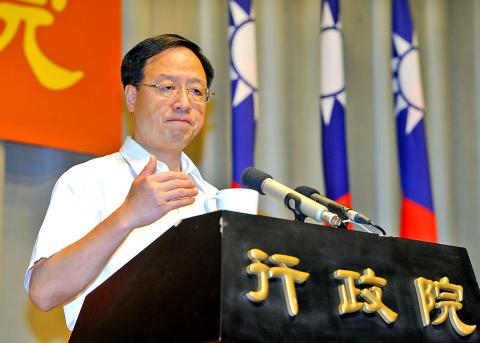Premier Jiang Yi-huah (江宜樺) yesterday said the government would “not go soft on the food safety problem” and would do everything in its power to root out food manufacturers producing adulterated foodstuffs.
“Shortages of lard will be solved by the emergency measure of relaxing rules on importing lard from countries such as Japan and Spain,” he told a press conference, reiterating the government’s determination to clamp down on the production of tainted food.
Jiang said it was confirmed in the Ministry of Health and Welfare’s latest inspection report that Ting Hsin Oil and Fat Industrial Co, a subsidiary of Ting Hsin International Group, had imported oil meant for animal feed from Vietnam and is therefore suspected of food adulteration and counterfeit.

Photo: Liao Chen-huei, Taipei Times
The Vietnamese government was contacted to confirm that the Vietnamese factory had not been manufacturing cooking oil, Jiang added.
The manufacturers that have been implicated in the recent scandal are major producers and wield great influence, “but the government will not go soft on them, regardless of their scale and market share,” Jiang said.
Because the strict measures might impose certain restraints and have repercussions on the domestic food and oil markets — after many downstream products had to be pulled off shelves in the past week and more are to be cleared from the market in the next week — consumers might encounter lard shortages in the near future, but the government would come up with supporting measures, Jiang said.
The Ministry of Economic Affairs, the Ministry of Finance, the Council of Agriculture and other related agencies convened on Friday and decided “to lift the restrictions on the importation of lard from countries such as Japan, Spain and other developed countries,” Jiang said.
“Certification and inspection work on those products will be done with care, and the tariffs will be adjusted accordingly in order to have domestic traders import the products as soon as possible and to avoid lard shortages,” he said. “The upstream materials needed for lard making will also be quickly imported as an emergency measure overseen by the council.”
As the public takes transparency seriously, Jiang said he has also required the health ministry to make public a list of companies and products suspected of using tainted oil as soon as possible.

The manufacture of the remaining 28 M1A2T Abrams tanks Taiwan purchased from the US has recently been completed, and they are expected to be delivered within the next one to two months, a source said yesterday. The Ministry of National Defense is arranging cargo ships to transport the tanks to Taiwan as soon as possible, said the source, who is familiar with the matter. The estimated arrival time ranges from late this month to early next month, the source said. The 28 Abrams tanks make up the third and final batch of a total of 108 tanks, valued at about NT$40.5 billion

Two Taiwanese prosecutors were questioned by Chinese security personnel at their hotel during a trip to China’s Henan Province this month, the Mainland Affairs Council (MAC) said yesterday. The officers had personal information on the prosecutors, including “when they were assigned to their posts, their work locations and job titles,” MAC Deputy Minister and spokesman Liang Wen-chieh (梁文傑) said. On top of asking about their agencies and positions, the officers also questioned the prosecutors about the Cross-Strait Joint Crime-Fighting and Judicial Mutual Assistance Agreement, a pact that serves as the framework for Taiwan-China cooperation on combating crime and providing judicial assistance, Liang

A group from the Taiwanese Designers in Australia association yesterday represented Taiwan at the Midsumma Pride March in Melbourne. The march, held in the St. Kilda suburb, is the city’s largest LGBTQIA+ parade and the flagship event of the annual Midsumma Festival. It attracted more than 45,000 spectators who supported the 400 groups and 10,000 marchers that participated this year, the association said. Taiwanese Designers said they organized a team to march for Taiwan this year, joining politicians, government agencies, professionals and community organizations in showing support for LGBTQIA+ people and diverse communities. As the first country in Asia to legalize same-sex

MOTIVES QUESTIONED The PLA considers Xi’s policies toward Taiwan to be driven by personal considerations rather than military assessment, the Epoch Times reports Chinese President Xi Jinping’s (習近平) latest purge of the Chinese People’s Liberation Army (PLA) leadership might have been prompted by the military’s opposition to plans of invading Taiwan, the Epoch Times said. The Chinese military opposes waging war against Taiwan by a large consensus, putting it at odds with Xi’s vision, the Falun Gong-affiliated daily said in a report on Thursday, citing anonymous sources with insight into the PLA’s inner workings. The opposition is not the opinion of a few generals, but a widely shared view among the PLA cadre, the Epoch Times cited them as saying. “Chinese forces know full well that